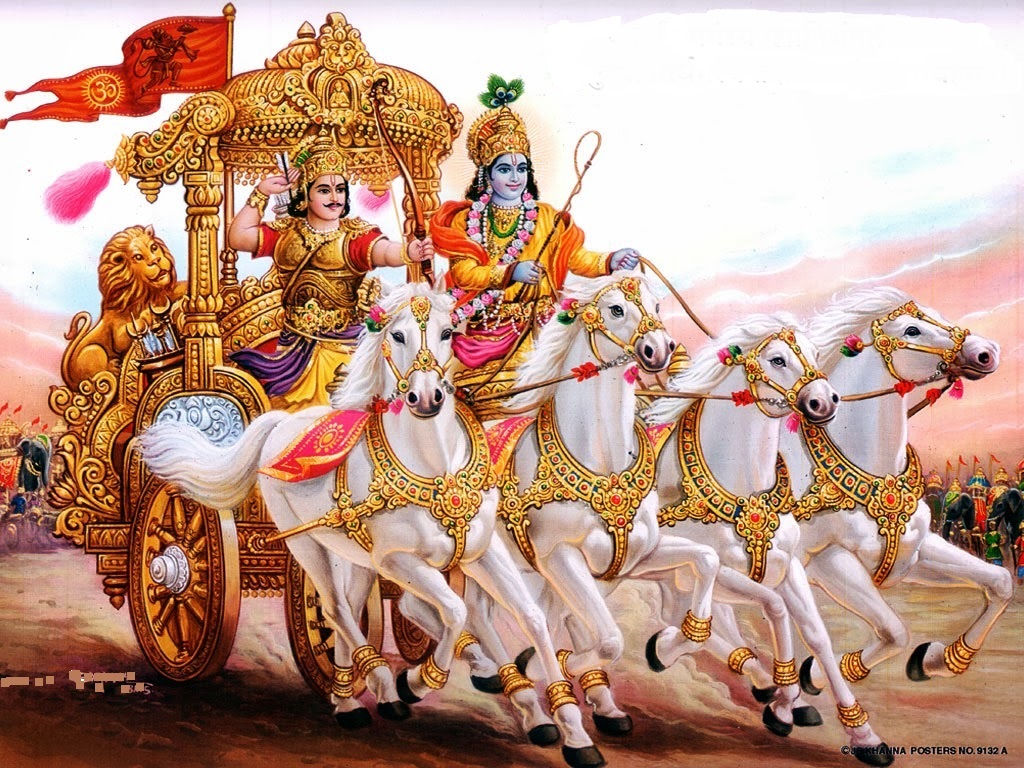22.10.2013 Srimad Bhagavadgeeta : Chapter-2.( Samkyayogam) Slokam-46. :
22.10.2013
Srimad Bhagavadgeeta :
Chapter-2.( Samkyayogam)
Slokam-46.
Yavan-artthah udapane sarvvtah samplutodake,
Tavan sarvveshu vedeshu bhrapmanasya vijanatah.
................................................................
Sarvvatah samplutodake = ( When ) Water flooded all over,
Udapane = ( Well, Pond, Lake ) The small water holes( sources),
Yavan-arttah = To what extent ( they are ) useful?
Vijanatah bhrapmanasya = To brahma-Jnani,
Sarvveshu Vedeshu = From all Vedas,
Tavan ( arttah ) = Useful to that extent only.
................................................................
A beautiful visual display in the right context. Usually we depend upon wells, ponds, lakes etc, like sources for our water requirement. Likewise the Sadhakas ( Spiritual-Practitioners ) depend upon the source of knowledge : the Vedas, and progress.
When flood water enters an area, it immerses all the water sources under it. Under such situation we never look for our previous water sources for our water requirements, because where ever you look water is every where.
Likewise those who have attained the Atmajnanam ( knowledge of Atma ), and experiencing 'Paripoornatha' (completeness/ full ), as far as such mahatmas are concerned they need not depend on Vedas. ( Here Vedas means's karma kandam' of vedas. )The whole divine pleasures promised by karma-kandam, altogether never match the ( equal to ) the bliss experienced by the Brahmajnani.
Karma-kandam expresses the karma which provides the happiness from the activation of their desires, these karma helps to fulfill the desires. Thus experience joy, but the fruit rewarded by these karma is perishable and incomplete. Where as the Atma-Anubhudhi ( Bliss ) provides complete, full, permanent joy. Therefore Jnani never depends upon Vedic-karma.
Do not misunderstand that Maharishi Vyasa Bhagavan abuses Karma-kandam. The aim of the Rishi is to divert the mind of those fools who think the path as the Lakshyam (aim) that is, imagination of : "the vedic-karma promising Punya-lokam (holy land ) is the aim of the life". To bring up those fools into awareness is the aim of the Vyasa Maharishi.
Sadhaka if does the karma without the desire for rewards, he can purify his citta (thoughts), thereafter gains the skill to viveka-vicharam ( discriminatory power ). Then and there he can visualise the 'TRUTH'. How is it possible to a Brahmajnani ( Supreme seeker ), who has already received 'Atma-sashatkaram'and experiencing completeness ( Bliss ), show interest in the perishable and temporary joy resulting by Vedic-karma?
What Aim Vedas are pointing : is Pure-Jnanam ( Knowledge of Paramatma ( the Supreme ) and Jeevatma ( the self ), that itself is the Atma-svaroopam ( Infinite /THE SUPREME TRUTH). This Jeevatma which is under the limits, in order to gain eligibility depends on Vedas. When realises the truth that he ( Jeevatma ) is the part of Infinite Paramatma, soon his limitations are vanished. Now he has become strong enough to bless Vedas too.
In lower classes at school, children byheart maths tables and store in their memory. But same students after becoming graduates : is there any need to learn maths-table?
...............................................................
.jpg)
.jpg)



Comments